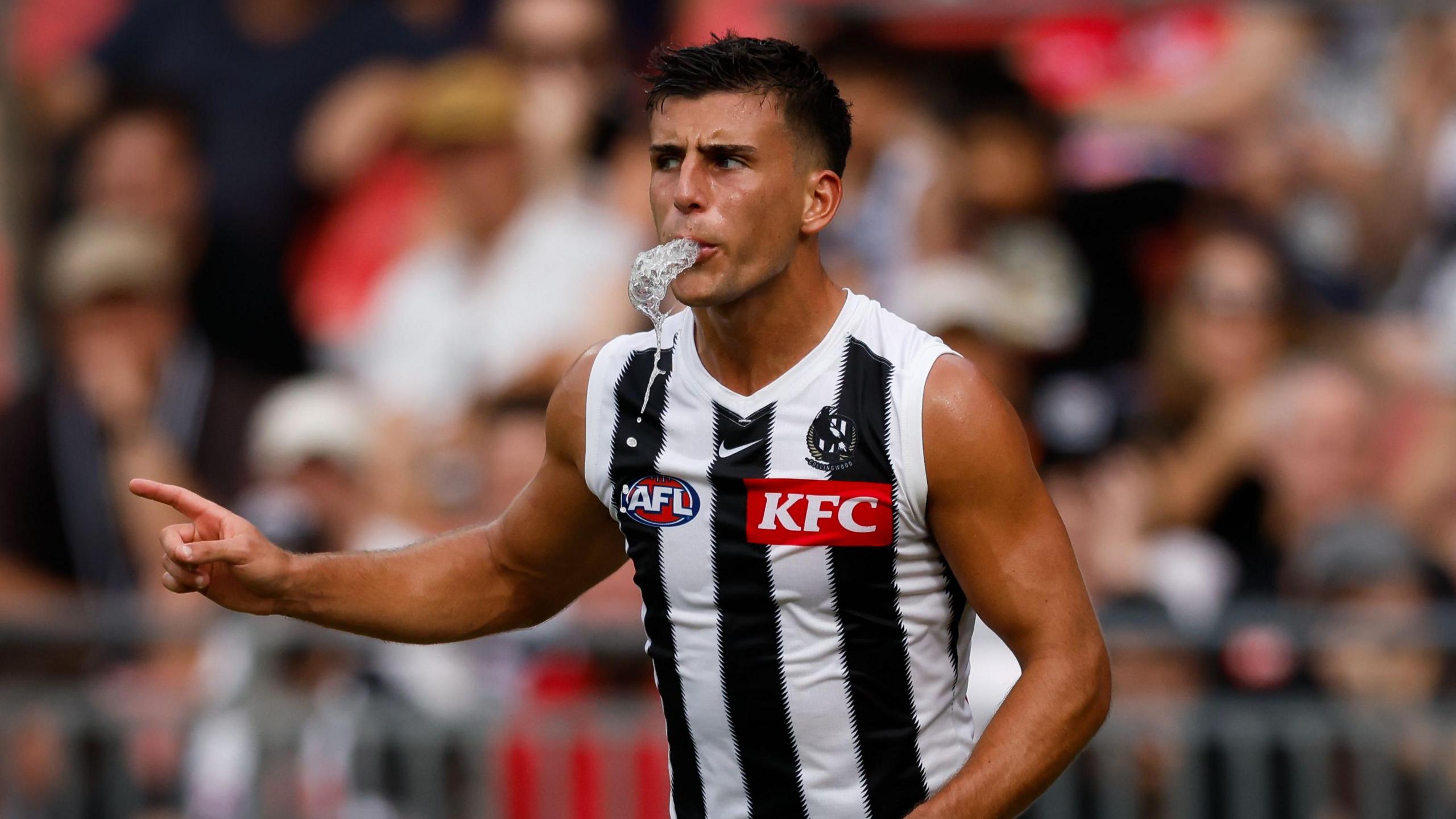Emma Middleton
BBC Sport journalist
It might not be your tipple of choice. But for many athletes, pickle juice has become a staple.
Carlos Alcaraz and Jannik Sinner were both seen sipping what was thought to be pickle juice during their five-set thriller of a French Open final.
But seeing athletes swigging the salty stuff isn’t anything new.
Former Arsenal midfielder Lucas Torreira was pictured drinking from a bottle labelled “pickle juice” back in 2019, and it became part of the England team’s strategy to combat cramp in players at Euro 2024.
Pickle juice is normally taken by athletes who are involved in sports with long durations, an hour and a half or more, or anything that involves intermittent or repeated muscle contractions.

Collingwood’s Nick Daicos was seen gargling pickle juice during an Australian Rules football match in March
How does pickle juice help athletes?
Pickle juice is used by athletes as a means of easing muscle cramps.
The acidic liquid is a concentrated source of electrolytes, containing sodium and potassium. It has been found to stop cramping 40% faster than drinking water.
It is thought that pickle juice works by disrupting ‘neural signalling’ – triggering a reflex in the mouth which sends a signal to stop muscles from cramping.
This can happen almost instantaneously – relieving cramping quickly.
How should athletes use pickle juice?
Mayur Ranchordas – a professor of sports nutrition and exercise at Sheffield Hallam University – believes there is still a misconception that pickle juice can be used to prevent muscle cramps.
There is no evidence to suggest that drinking the juice before a sports event would have any benefit.
Instead, athletes should be taking it at the onset of cramp – but not drink it.
“Rather than drinking it, you need to rinse it in your mouth for 20 to 30 seconds. That’s when the vinegar and salt start to act, then you can spit it out”, Ranchordas told BBC Sport.
The mistake that some athletes make is to rinse their mouth out with water, to get rid of the taste.
Removing that sensation – of taking pickle juice and wanting to scrunch up your mouth in response – stops the mechanisms firing which ease the cramp.
Ranchordas, who is also the head of nutrition at Aston Villa football club, says that adding chilli to the jar of pickles, and letting the chilli infuse, can make the pickle juice even more effective.
“The more horrible the taste, the more effective it is.”
What’s wrong with a sports drink?
The more palatable option – for the non-pickle-lovers out there – might be a sweet sports drink.
But the unique offering of pickle juice that it can disrupt the message sent to the brain that a muscle is cramping.
This is a much faster method of easing cramping than having an electrolyte, which you have to digest and absorb.
But Emma Tester – a performance nutritionist currently working at the UK Sports Institute – told BBC Sport that more research is needed to understand the added benefits of pickle juice.
“There is not a huge amount [of research] out there definitely saying ‘yes, it’s really going to work. It is down to the individual, whether they feel it is beneficial.”
Could you just eat lots of pickles, then?
Not quite. Pickle juice is thought to be effective because of the concentration of electrolytes, combined with the fluid.
Eating lots of pickles might not be very comfortable on the stomach either, nor very practical. It might not be easy to munch some pickles on the side lines of a football pitch, or on court between games of a tennis match.
Are there any risks?
Pickle juice might not sit well with everyone, potentially causing digestive issues because it is so concentrated and salty.
Dr Tester says she has seen athletes “puke on the side of the pitch” after taking pickle juice, which can hinder performance rather than help it.
“Everything needs to be practiced. Just like performance is practiced, nutrition performance should also be practiced,” she said.
This article is the latest from BBC Sport’s Ask Me Anything team.
What is Ask Me Anything?
Ask Me Anything is a service dedicated to answering your questions.
We want to reward your time by telling you things you do not know and reminding you of things you do.
The team will find out everything you need to know and be able to call upon a network of contacts including our experts and pundits.
We will be answering your questions from the heart of the BBC Sport newsroom, and going behind the scenes at some of the world’s biggest sporting events.
Our coverage will span the BBC Sport website, app, social media and YouTube accounts, plus BBC TV and radio.







